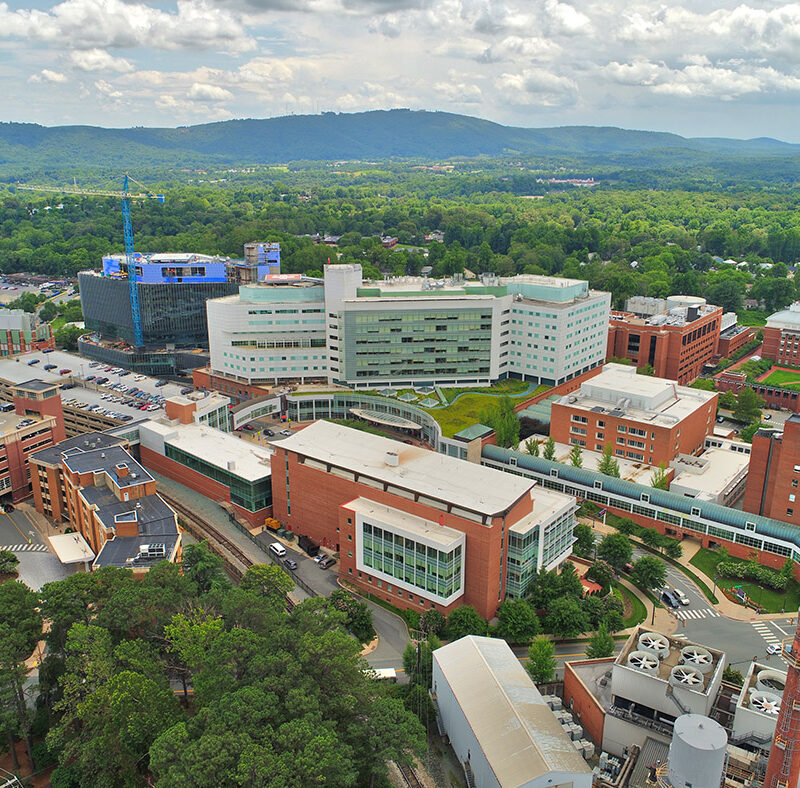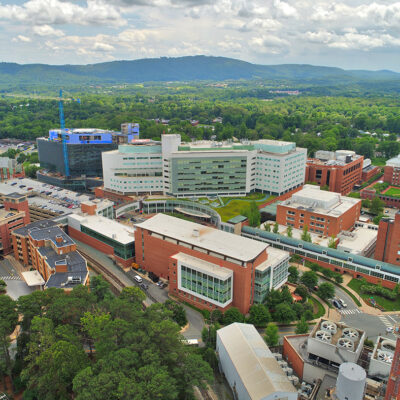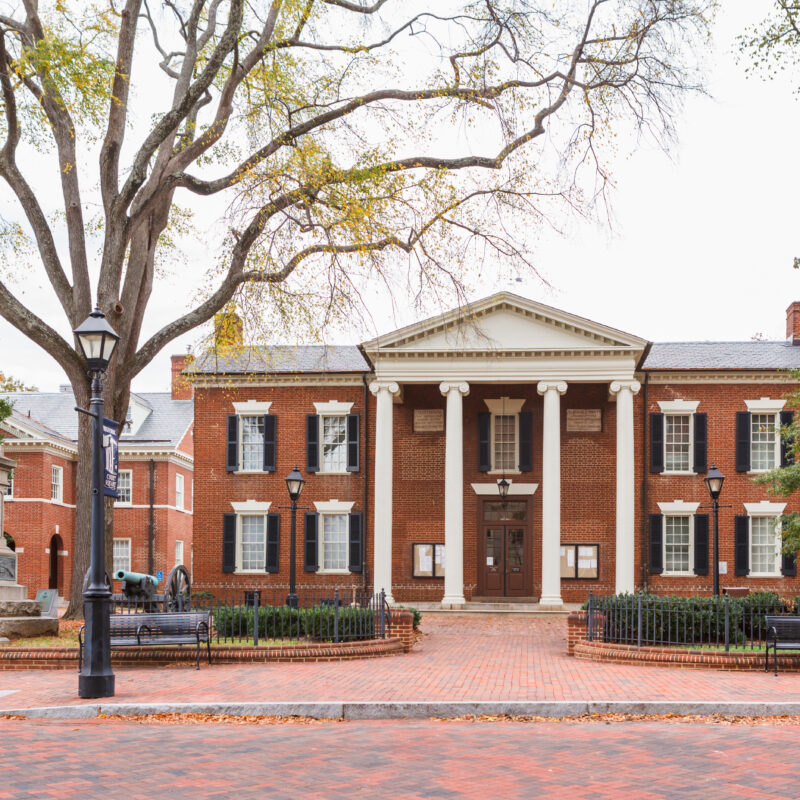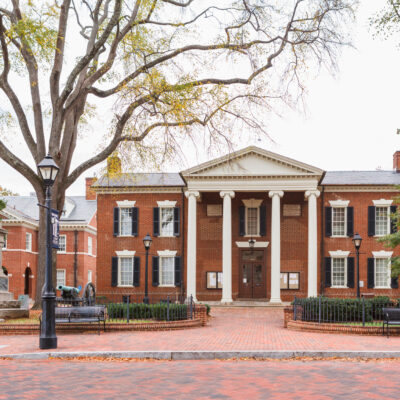In normal times, one in six Charlottesville residents—nearly 8,000 people—lack adequate access to affordable, healthy food. That’s 6 percent higher than the statewide food insecurity rate. And with thousands of citizens newly unemployed due to COVID-19, our food insecurity numbers have significantly increased, exacerbating underlying disparities.
Dozens of area nonprofits have been working for years to fight this complex, systemic issue, which disproportionately affects people of color, and when the coronavirus left many more residents in need of food assistance, these groups redoubled their efforts. What follows is a glimpse of a few of the local individuals and organizations that are feeding their friends and neighbors in need.
PB&J Fund
When COVID-19 shut down city schools, many students were at risk of going hungry because they’d lost access to their free (or reduced-price) breakfasts and lunches. The PB&J Fund, which teaches students how to make healthy, affordable recipes at home with their families, stepped in immediately, organizing volunteers to pack and hand out bag lunches on March 15.
The following day, city schools began distributing grab-and-go meals—but only on weekdays. To feed children on the weekends, the PB&J Fund set up a delivery program, dropping off bags of groceries on the doorsteps of more than 300 families every Friday.
“They are primarily shelf-stable items, with a little bit of fresh produce,” mainly from locally owned grocery stores, food banks, and farmers, says the fund’s Executive Director Alex London-Gross. “We want to ensure that people have options.”
While programs like this have been necessary in Charlottesville “for years and years,” says London-Gross, they are especially crucial now. With household staples flying off the shelves, it has been difficult for low-income families to get to stores in time to purchase all they need, often due to their work schedules. Charlottesville Area Transit’s reduced schedules have made shopping even tougher for those without access to a car.
“We have kids [waiting] at the front door who know what time their bag is going to be delivered,” says London-Gross. “They’re so appreciative.”
The PB&J Fund will continue to deliver groceries through the end of August, but plans after that are up in the air, says London-Gross. If city schools reopen (in some capacity), it may pivot to assist other community organizations with their food relief needs. It may also begin teaching cooking classes again, but in a virtual format.
We are really looking forward to “getting back to the educational piece of our work,” says London-Gross.
Keevil & Keevil Grocery and Kitchen
When local chef Harrison Keevil had to close down his family’s store, Keevil & Keevil Grocery and Kitchen, back in March, he immediately thought of his Belmont neighbors. What if they lost their jobs? How were they going to eat?
Right away, he began leaving 15 free lunches every day in front of the eatery for anyone who was hungry, no questions asked. But he wanted to do more.
By April, Keevil had forged partnerships with multiple area organizations that serve vulnerable populations—including PACEM, Habitat for Humanity of Greater Charlottesville, The Arc of the Piedmont, and The Haven—to provide freshly prepared meals, using ingredients purchased directly from local farmers.
And over the past few weeks, Keevil’s hunger relief program—called #FeedVirginia—has expanded its partnerships into rural areas like Goochland, Keevil’s hometown.

Chef Harrison Keevil has distributed about 24,000 meals through his #FeedVirginia program. PC: John Robinson
“We work with our partners to determine how many meals they would like, and either we or volunteers deliver it, or someone comes to pick it up from that group” every Tuesday through Thursday, says Keevil. “And Tuesday through Friday, we’re still putting out free meals in front of the shop.”
One-hundred percent of profits from Keevil & Keevil’s regular food and catering sales go toward funding the program, in addition to GoFundMe donations. While this new business model hasn’t been easy to adopt, says Keevil, the store has been able to stay self-sufficient, and currently has enough funds to get through the next few months.
“This has been one of the hardest things I’ve ever done professionally, but it’s also been the most rewarding,” he says. Before starting #FeedVirginia, “I hadn’t realized how lost I truly was. It has definitely reset me, and opened my eyes to why I love cooking and why I got into it in the first place—to take care of people [and] put smiles on people’s faces.”
The program has distributed about 24,000 meals to date—and has no plans of stopping anytime soon. “We will do whatever we can to keep this going [and] make sure we’re always there, especially for the Belmont community,” Keevil says. “We are here to stay.”
Local Food Hub
As soon as the University of Virginia shut its doors in mid-March, Portia Boggs, communications director for the Local Food Hub, knew that things were about to get “really bad” for area farmers, who rely heavily on wholesale sales to schools, restaurants, and other institutions.
Her worst fears were soon confirmed: Following closures all over the city and surrounding counties, farmers reported a more than 90 percent drop in sales. They weren’t sure how, or if, they were going to make it through the pandemic.
At the same time, “grocery store shelves were empty, and people were freaking out about whether or not they would be able to get enough to eat,” says Boggs.
To both help farmers and meet consumer demand, the Local Food Hub created a drive-thru market, held every Wednesday and Friday in the former Kmart parking lot on Hydraulic Road.

The Local Food Hub hosts drive-thru markets twice a week in the former Kmart parking lot on Hydraulic Road. PC: Supplied photo
Because customers place their orders online, “there’s absolutely no contact between anyone,” says Boggs. They just have to show up at their designated pick-up time and put a sign with their name in their front car window, and employees will put their order in their trunk.
The model has been very successful, bringing in hundreds of thousands dollars in sales to date for its 20 vendors. More drive-thru markets have since popped up around town.
“We’ve been completely blown away by the support from the community,” says Boggs. “So many of our vendors tell us that we either played a huge role in or were responsible for keeping them in business, and making it possible for them to survive.”
To further help families facing economic hardship, Local Food Hub expanded its preexisting food relief program, Fresh Farmacy, which currently provides locally grown produce to 600 low-income families every week.
While there is no set end date for either of the programs, Boggs hopes that “once things normalize a little bit more, people will remember the benefits of local food systems, [as well as] everyone having access to equitable food,” she says. We need to “continue to invest in that and prioritize that as a long-term solution, and not just an emergency response.”
Cultivate Charlottesville
For years, the Food Justice Network, City Schoolyard Garden, and the Urban Agriculture Collective have fought together to create a healthy and equitable food system in Charlottesville. To better achieve their mission and amplify their impact, the three organizations decided in April to come together as one: Cultivate Charlottesville.
Since the start of the pandemic, each of Cultivate Charlottesville’s programs has been working to provide emergency food security response, tapping into partnerships to expand current initiatives and create new ones, thanks to “a huge swell in interest and support not only from donors but individuals,” says Cultivate Charlottesville’s Executive Director Jeanette Abi-Nader.
Every week, the Urban Agriculture Collective, which works with public housing residents to grow fresh food, has hosted a free community market for families in need, distributing produce from its Sixth Street farm.
In collaboration with nonprofits Charlottesville Frontline Foods and Charlottesville Community Cares, the Food Justice Network has given out freshly prepared meals from local restaurants—particularly those run by people of color—to public and subsidized housing residents, as part of its efforts toward racial equity.

Food Justice Network associate Gabby Levet believes the pandemic has strengthened Cultivate Charlottesville’s partnerships, helping it to better respond to future community issues. PC: Marley Nichelle
During Charlottesville City Schools’ spring break, volunteers from City Schoolyard Garden and the Chris Long Foundation teamed up to deliver 4,000 meals from Pearl Island Catering and Mochiko Cville to students living in neighborhoods with high enrollments in the free and reduced-price meal program.
And as a collective, Cultivate Charlottesville has partnered with the local health department, plus other community organizations, to sponsor free COVID-19 testing in Black and Latino communities, which have been disproportionately impacted by the virus. It’s also worked to provide wraparound services, including groceries, medication, cleaning products, and PPE.
“Working with so many people across sectors and coming up with solutions in short spans of time…unlocks so much potential moving forward to respond to other community needs and broader issues that arise,” adds Charlottesville Food Justice Network associate Gabby Levet. “Those relationships will not be lost.”
However, these relief programs, among others, aren’t intended to become the “norm” for achieving food equity, says Abi-Nader. “We still want to develop principles and practices to build towards that longer-term food security,” she says, such as by securing more land for urban gardens. We want this to be “a part of what the community sees as necessary for being a healthy and better Charlottesville.”
Blue Ridge Area Food Bank
At the onset of the COVID-19 pandemic, the Blue Ridge Area Food Bank—which provides food assistance to 25 counties and eight cities in central and western Virginia—was faced with a big challenge. With thousands of residents out of a job, a lot more food needed to be distributed to its community partners, including food pantries, soup kitchens, and shelters. But BRAFB had a drastic reduction in volunteers, and needed to limit the amount of people allowed to work during a shift to 10.
Fortunately, it immediately received “a historic outpouring of support,” says Community Relations Manager Abena Foreman-Trice, “allowing us to spend more than $2.7 million in response to the crisis, with nearly all of that going toward food purchases.” When the food bank put out a call for healthy, low-risk volunteers, around 700 people signed up to give out food to their neighbors in need.

A volunteer from the Blue Ridge Area Food Bank hands out bags filled with household staples. PC: Supplied photo
Thanks to this substantial backing from the community, BRAFB has been able to keep nearly all of its partner food pantries open. Using low and no-touch food distribution practices, like curbside pickup and home deliveries, it has safely served 15 percent more people than it did at this time in 2019—roughly 115,000 in May alone, according to its latest stats.
In collaboration with community partners, BRAFB has increased its outreach efforts to vulnerable populations. With the help of volunteers from the Jefferson Area Board for Aging, it has distributed and delivered food boxes to senior citizens in need in Charlottesville and surrounding counties.
“We can’t predict when things will go back to the way they were before COVID-19….our response to the pandemic could go on for many more months,” says Foreman-Trice. Nonetheless, “we can remain ready to help individuals and families when they need us.”





